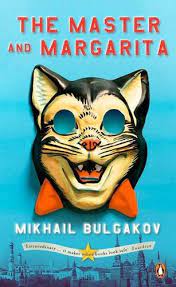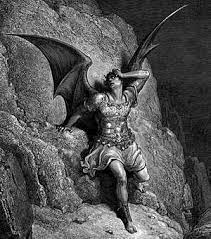"I am part of that power which eternally wills evil and eternally works good" - Faust, Goethe
When Mikhail Alexandrovich Berlioz (or Massolit) and Ivan Nikolaevich Ponyrev (Homeless) meet for drinks under the cool of the linden trees near Moscow's Patriarch Ponds an oddity is observed. Nobody else is around. It is not the last oddity. Soon, a "transparent citizen" appears in a jockey cap and a checkered jacket made of air. Seven foot tall too.
The two men assumed him to be a foreigner or "foreign goose". English? German? French perhaps? Maybe a Pole? But this foreign goose seemed to know things for absolute certain. The existence of Jesus, for example, he not only asserted as fact but claimed to have been there when Pontius Pilate had Jesus, or Yeshua - alias Ha-Nozri, sentenced to death and Bar-Rabban (Barabbas) saved.
I'd tried to read Mikhail Bulgakov's supernatural satire (or maybe magical realist masterpiece) The Master and Margarita (released in 1967, nearly three decades after Bulgakov's death) twice before and had both times been defeated. But, having promised myself I'd review it for my Read it in Books strand, on EIAPOE this time I was determined.
It wasn't an easy read (at least not for me) and, in all honesty, it wasn't a read I enjoyed much. I tried to do a chapter a day but my heart just wasn't in it. I'm not 100% sure why. Maybe I'm just not a good reader, maybe I lack imagination, or maybe it wasn't the right story for me at this time in my life.
Though, possibly, it's just not my sort of book. There are huge numbers of seemingly interchangeable characters and there are lengthy passages where very little seems to happen, punctuated by violent and surreal happenings that caught me off guard as I was tuning out by the time they came along.
Back at Patriarch Ponds, the foreign visitor is being told by Homeless and Massolit that not only is there no Jesus and no God but there is no Satan either. This is met with "such laughter that a sparrow flew out of the linden" and then, more alarmingly, Massolit is decapitated by a speeding tram.
He died in exactly the same way that the foreign visitor had just foretold he would. From hereon in the oddities continue but get bloodier and more bizarre. The accurate predictor of death is soon joined by a soot black tom cat with "a cavalryman's whiskers" who walks upright on his hind legs, takes the tram on his own, and eats frankfurters.
People randomly disappear and people randomly reappear (sometimes both, poor Styopa Likhodeev manages to seemingly evaporate in Moscow and then turn up on a jetty in Yalta, over nine hundred miles away with no knowledge of how he got there or what had happened to him). In general, chaos is loosed upon Moscow.
Bonkers chaos (a suit with no person wearing it writes of its own volition, sparrows dance the foxtrot, hogs gain the gift of language, rooks work as chauffeurs, chess pieces come to life, and a hat turns into a kitten) but violent chaos too. Sometimes it feels like a baroque, or rococo, LSD trip.
Of course a demon, rather than a tab of acid, appears to be behind it all. But what sort of demon could exist in the strictly atheist Soviet Union and how much power could such a demon hold? Debates as to the existence of Jesus as a person and the nature of good and evil suggest Bulgakov was making some very important, if not entirely clear, points about forced atheism in the Soviet Union but I wasn't bright enough to work out exactly what they were.
A classical education, which I determinedly have not had, might have helped me understand the references to Tacitus, Flavius Josephus, and Philo of Alexandria and an even wider knowledge of ancient history would have been useful when the text touched on the Aztec god Vitzliputzli or the Phoenician deity Tammuz. Modern philosophers like Kant and Schiller also get a look in and it might also help to know what the words flacon and chevelure mean.
I looked them up, of course, but they didn't really help. I don't doubt this book is a classic, too many people I respect have said so, but either I'm too dumb for it, I read the wrong translation (as has been suggested by some), or I just didn't, bar some of the fascinating spectacle described, enjoy this book very much. Sadly.









No comments:
Post a Comment